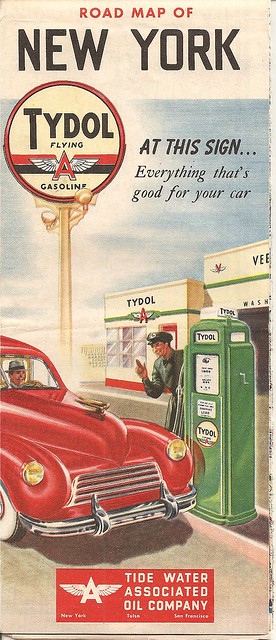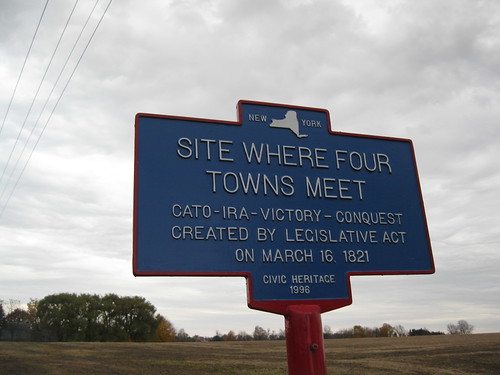Blue Highways: Conquest and Cato, New York
Unfolding the Map
 If you're a map lover, or you like stories about where towns get their names, or you are into irony, then there's something of each in this post. If you love all three, you've hit the jackpot! We'll pass through Conquest and Cato with William Least Heat-Moon (LHM), and then move on. But before we do, see where these places are located by referencing the map.
If you're a map lover, or you like stories about where towns get their names, or you are into irony, then there's something of each in this post. If you love all three, you've hit the jackpot! We'll pass through Conquest and Cato with William Least Heat-Moon (LHM), and then move on. But before we do, see where these places are located by referencing the map.
Book Quote
"Off I went, hoping Conquest would find me. In the dairy country, chewing Holsteins and Guernseys switched their tails and flicked their skins. On the other side of Johnny Cake Road lay Conquest. Then I began the game again, looking for Cato. Along the roads were cottage industries selling clothesline poles, purple martin houses, potted plants, AKC pups."
Blue Highways: Part 5, Chapter 8
 Sign depicting the intersection of Cato, Ira, Victory and Conquest, New York. Photo by "Dougtone" and hosted at Flickr. Click on photo to go to host page.
Sign depicting the intersection of Cato, Ira, Victory and Conquest, New York. Photo by "Dougtone" and hosted at Flickr. Click on photo to go to host page.
Conquest and Cato, New York
Sometimes you wonder how towns got their names, especially if those names are interesting. Many towns are named in honor of people, some are taken from place names already in the area, some are named after cities of antiquity. In fact, as we travel with LHM through this area, we'll find cities like Palmyra, New York, named after an ancient city in Syria, and Syracuse, New York, named after a city established by the ancient Greeks on the island of Sicily.
I have two directions that I'm going to go in this post. One of my previous posts explored city names with an ironic twist. In the case of Conquest and Cato, there is an irony. I think that LHM thought he was looking at a little bit of irony when he mentioned in Blue Highways that Conquest is just down the road from Victory. But there's even more irony here than that, but it's a little convoluted.
First, Cato. Cato is one of a number of towns established in a large tract of land, called the Central New York Military Tract, that was reserved for ownership and settlement by New York veterans of the Revolutionary War. The idea of setting land aside was conceived by the U.S. Congress to compensate veterans, and was to consist of 100 acres of land per soldier. However, New York was slow in getting this land together, so the state legislature set an additional 500 acres per land, for a total of 600 per soldier, in a series of 28 contiguous townships in the middle of the state.
The townships were allegedly named by a clerk in the New York Surveyor General's office, who was an avid reader of classical literature. Thus, the township name of Cato was joined by other townships named Lysander, Hannibal, Brutus, Camillus, Cicero, Manlius, Aurelius, Marcellus, Pompey, Romulus, Scipio, Sempronius, Tully, Fabius, Ovid, Milton, Locke, Homer, Solon, Hector, Ulysses, Dryden, Virgil, Cincinnatus, Junius, Galen and Sterling.
Conquest was a settlement within the township of Cato, but became independent of Cato after a political dispute. Upon achieving their desired political aims, Conquest immediately declared victory by starting a new town called Victory, and later giving LHM something to wonder about when he sees the two places on the map.
However, the Cato-Conquest-Victory saga is not free of irony yet. Cato Township could have been named after Cato the Elder, a Roman military commander and statesman. If that were the fact, then Cato Township having birthed Conquest and Victory has no irony whatsoever. However, it is more likely that the township of Cato was named after Cato the Younger, a Roman statesman and philosopher of the school of Stoicism. As a Stoic, Cato the Younger would have held the belief that emotions can be destructive forces, especially if used to try to control inevitable universal forces, and that reason and ultimate happiness came from keeping oneself under self-control and evincing fortitude. One cannot control what the universe and should not try, and if one is virtuous and in control, one is immune to misfortune. The early Greek Stoics even eschewed politics because they believed in cosmopolitanism - that one is a citizen of the greater world and not just of one political entity. Thus, the irony. The town of Conquest was born out of political dispute with the township of Cato, complete with the investment of anger on both sides, and is an example of petty and small political concerns over brotherhood and equality that Cato the Younger would have emphasized.
That's an interesting little story, but here's the other point I want to make in this post. Many place names in the United States are derived from ancient Greece and Rome, or from Europe. This makes sense, as the U.S. is a nation of immigrants. Therefore, the first English settlers on the East Coast gave their towns and states and regions names that evoked their homeland, such as Dover (Delaware), Cambridge (Massachusetts), Camden (New Jersey), New York City, and Plymouth (North Carolina).
Of course, other ethnic groups that made up this country named areas that evoked their own homes. We have many place names in the Southwestern U.S., for instance, that are Spanish. Germans added places in the U.S., often multiple times, as Berlin, Potsdam, Hamburg and Hanover. Names that evoke Italy include Milan (multiple states), as well as Rome (multiple states), Naples (Florida), Venice (multiple states), and Florence (multiple states).
New York was New Amsterdam in its early years as a Dutch settlement on Manhattan. In the middle of Texas, you can find Czech town names. French place names are found all over the United States, given that much of the middle part of the country was explored by French explorers and trappers.
It all makes me wonder, given that the United States is in a period where it is the preeminent power in the world, if that a thousand years from now the names of our great personages will dot the globe. Will we see a village, town or city of "Gates" spring up in China, or a "Jobs," India? Will someone name a town after Jefferson in Africa (the capital city of Liberia, Monrovia, is named after President James Monroe)? Will the U.S. even have people, academicians or politicians or celebrities or captains of industry, who are deemed important enough to name places after in other parts of the world?
Let's take our query a little further. Will the U.S. have enough impact on the world that someday we will see a New Chicago spring up in another country? Will a Houston or Dallas appear in some other region of the world to one day rival the memory of their American forebears, just as New York dwarfs Old York, and Boston, Massachussetts is more well known than its English namesake. Does the United States have anything to offer the world so that even one day, when our empire crumbles as it will, as it must, some place names will evoke the country that pioneered a working, large scale democracy for the world? Or will something happen that causes American emigration - a huge diaspora to other regions of the world - so that those peoples, in foreign lands, remember their lost homeland by naming their settlements and towns after the places they left?
We see the remnants and memories of some past great civilizations every day in the names that we have chosen to give to places in the U.S. When our time is past, will we be worthy of such remembrance, or will we fade into obscurity like other civilizations whose memories are locked in museums and books. It's interesting to think about and speculate.
Musical Interlude
I'm not sure why I thought of this song, I Don't Wanna by the Asylum Street Spankers, except that it has a lot of place names in it. It's a catchy tune, though.
How many of the place names in the song do you know or have you been to? See bottom of page.*
If you want to know more about Conquest and Cato
An 1879 History of Conquest
Town of Conquest
Village of Cato
Wikipedia: Town of Cato
Wikipedia: Village of Cato
Wikipedia: Conquest
Next up: Somewhere on the north side of Oneida Lake
*Place names in song: Scotland, Wales, England, France, Moscow, Malta, Spain, Cuba, Brooklyn, Paris, Rome, Teapot Dome, Orleans, Cairo, Broadway, 21, India, Georgia, Pismo Beach, Smithfield, China, your house.




 Thursday, May 24, 2012 at 1:34PM
Thursday, May 24, 2012 at 1:34PM
